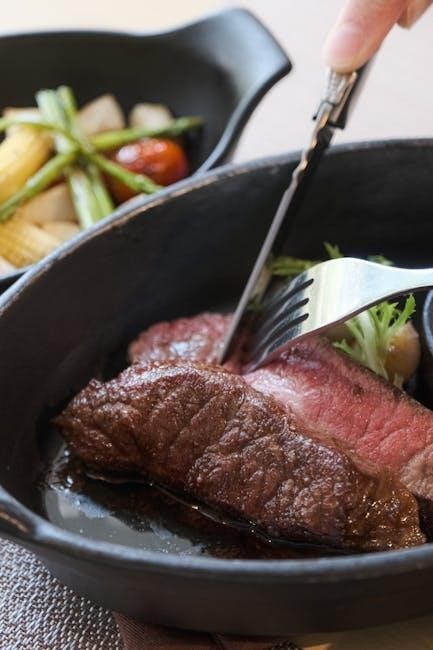The Maine Guide Course offers comprehensive training for aspiring outdoor professionals, covering essential skills like wildlife identification, navigation, and safety to prepare for the state licensing exam successfully.
Overview of the Maine Guide License
The Maine Guide License is a prestigious certification that enables individuals to legally guide outdoor activities such as hunting, fishing, and recreation in Maine. It is issued by the Maine Department of Inland Fisheries and Wildlife and requires applicants to demonstrate expertise in specific areas. The license is categorized into types, including Recreation, Fishing, and Hunting Guide licenses, each requiring specialized knowledge and skills.
Obtaining the license involves passing a rigorous exam and meeting eligibility criteria, including hands-on experience and first aid certification. The process ensures that guides are well-prepared to lead safe and enjoyable trips. A $125 fee applies per classification, and applicants must prove their proficiency in areas like wildlife identification, navigation, and client care. This certification is highly respected and essential for professionals seeking to lead outdoor adventures in Maine’s diverse wilderness.
Importance of Becoming a Registered Maine Guide
Becoming a Registered Maine Guide is a prestigious achievement that enhances your credibility as an outdoor professional. It demonstrates a deep understanding of Maine’s wilderness, ensuring safe and enjoyable experiences for clients. The certification is highly respected, opening doors to career opportunities in guiding, tourism, and conservation. It also fosters a sense of community among guides, promoting shared knowledge and best practices. The rigorous process ensures guides are well-prepared to handle diverse outdoor scenarios, from navigation to emergency response. This certification not only validates your expertise but also contributes to the preservation of Maine’s natural resources by promoting sustainable and responsible outdoor practices.
History of the Maine Guide Program
The Maine Guide Program has a rich history dating back to 1897, making it one of the oldest professional guide certification programs in the United States. Established to ensure high standards for outdoor guiding, the program initially focused on hunting and logging guides. Over time, it expanded to include specialties like fishing, recreation, and sea kayaking. The program has evolved to reflect Maine’s diverse outdoor opportunities, emphasizing safety, environmental stewardship, and client care. Today, it remains a cornerstone of Maine’s outdoor heritage, with a rigorous testing process that has become a badge of honor for those who complete it. The program’s enduring legacy is a testament to Maine’s commitment to preserving its natural resources and promoting responsible outdoor leadership.

Licensing Process and Requirements
Becoming a Registered Maine Guide involves a rigorous process, including exams, fees, and specialized training to ensure high standards of safety, knowledge, and professionalism.
Steps to Obtain a Maine Guide License
To become a Registered Maine Guide, applicants must meet eligibility criteria, including age and residency requirements, and complete a series of steps. First, applicants must prepare for the licensing exam through specialized training or self-study, focusing on topics like wildlife identification, boating safety, and trip planning. Next, they must pass both written and oral exams administered by the Maine Department of Inland Fisheries and Wildlife. Additionally, applicants must pay a $125 fee for each license classification they seek, such as recreation, fishing, or hunting. Current first aid and CPR certification is also mandatory for all applicants. Finally, hands-on experience and a demonstrated ability to lead safe and informed outdoor trips are critical for success. These steps ensure that only qualified individuals earn the prestigious Maine Guide License.
Eligibility Criteria for Applicants
To qualify for the Maine Guide License, applicants must meet specific eligibility criteria. Candidates must be at least 18 years old and demonstrate a strong understanding of Maine’s outdoors. Proficiency in skills such as wildlife identification, boating safety, and navigation is essential. Applicants must also provide proof of residency in Maine and pass a background check. Additionally, a current first aid and CPR certification from an approved provider, such as the American Red Cross, is required. Candidates must also pay a $125 fee for each license classification they seek, such as recreation, fishing, or hunting. These requirements ensure that only capable and knowledgeable individuals are licensed to guide others safely and effectively in Maine’s diverse outdoor environments.
Exam Preparation and Testing Process
Preparing for the Maine Guide exam requires thorough study and hands-on experience. The exam includes both written and oral components, testing knowledge of Maine’s outdoors, wildlife, and safety protocols. Candidates must demonstrate proficiency in areas such as wildlife identification, boating laws, navigation, and client care. The written exam covers theoretical knowledge, while the oral exam assesses practical skills and decision-making. The Maine Department of Inland Fisheries and Wildlife administers the tests, with a high first-time failure rate due to the exam’s rigor. Applicants are encouraged to use study guides, online resources, and preparatory courses to ensure readiness. Passing the exam is a critical step toward obtaining the Registered Maine Guide license, ensuring guides are well-qualified to lead safe and enjoyable outdoor experiences.
Classification of Maine Guide Licenses
Maine Guide licenses are classified into specific categories based on the type of outdoor activities guides conduct. The primary classifications include Recreation, Fishing, Hunting, and Sea Kayaking guides. Each license allows guides to lead trips in their specialized area. Recreation Guides can lead hiking, biking, or skiing trips, while Fishing Guides specialize in freshwater or tidal fishing excursions. Hunting Guides assist with hunting trips, ensuring safe and ethical practices. Additionally, there are specialized licenses for Whitewater Guides and Tide-Water Fishing Guides, each requiring unique expertise. These classifications ensure guides are qualified to lead safe and enjoyable experiences tailored to their area of expertise. The specific license type determines the scope of activities a guide can legally offer, ensuring both client safety and adherence to state regulations.
Training Programs and Courses
Maine Guide training programs offer hands-on and classroom instruction, covering essential outdoor skills, safety protocols, and industry standards to prepare candidates for licensing exams and real-world guiding scenarios.
Registered Maine Guide Schools and Training Centers
Reputable schools like the Maine Guide School and Three Rivers Whitewater Inc. offer specialized training programs for aspiring guides. These centers provide hands-on field experience, exam preparation, and expert instruction. Many programs are state-approved, ensuring comprehensive coverage of required skills. Schools such as Northeast Whitewater Lodge & Guide Service focus on practical training in areas like boatmanship, wildlife identification, and trip logistics. Some centers, like Alice’s Awesome Adventures, offer personalized learning experiences tailored to individual needs. These programs often include first aid certification and real-world scenarios to build confidence and competence. With experienced instructors and small group sizes, these training centers are designed to equip students with the knowledge and skills needed to succeed as professional Maine Guides.
Distance Learning and Hybrid Courses
Distance learning and hybrid courses provide flexible options for aspiring Maine Guides, combining online study with hands-on training. These programs, offered by approved providers like Maine Guide Training and Alice’s Awesome Adventures, allow students to prepare for the licensing exam at their own pace. Hybrid courses blend self-study with in-person sessions, covering topics such as wildlife identification, navigation, and trip planning. Many programs include personalized instruction and access to experienced guides. Distance learning platforms often feature interactive materials, videos, and quizzes to engage students. Hybrid models ensure practical skills are developed through real-world applications. These courses are ideal for those balancing other commitments while pursuing their guide certification, offering a structured yet adaptable path to becoming a Registered Maine Guide.
Hands-On Training and Field Experience
Hands-on training and field experience are crucial components of the Maine Guide Course, ensuring students gain practical skills in real-world settings. Programs like the 45-hour Recreation Maine Guide School offer immersive training, covering boatmanship, river geography, and rescue techniques. Students engage in activities such as whitewater rafting, sea kayaking, and hiking, learning to navigate diverse terrains and conditions. Field exercises focus on equipment care, outdoor trip logistics, and client safety. Many courses include meals and lodging, simulating actual guiding scenarios. Experienced instructors provide personalized feedback, helping students refine their skills. This practical approach ensures graduates are well-prepared to lead safe and enjoyable outdoor adventures, making hands-on training indispensable for aspiring Maine Guides.
First Aid and CPR Certification Requirements
First Aid and CPR certification are mandatory for obtaining a Maine Guide License, ensuring guides can respond to medical emergencies effectively. Courses must meet standards set by the American Red Cross or equivalent, focusing on wilderness and outdoor scenarios. Many training programs integrate these certifications, offering paramedic-led instruction. A fee of $125 per classification applies for new applicants. Renewing guides must maintain current certification, with whitewater guides requiring additional CPR proof. These requirements ensure guides can provide critical care, making them indispensable for safe outdoor adventures. Practical training and real-world application are emphasized, preparing guides to handle emergencies confidently and efficiently in remote settings.

Key Skills and Knowledge Areas
The Maine Guide Course emphasizes essential skills such as wildlife and plant identification, navigation, boating safety, and client care to ensure guides are well-prepared for outdoor leadership roles.
Wildlife and Plant Identification
Wildlife and plant identification are core components of the Maine Guide Course, ensuring guides can accurately recognize and interpret the state’s diverse flora and fauna. Students learn to identify native species, understand their habitats, and recognize signs of wildlife activity. This knowledge is critical for leading safe and informative outdoor trips. Practical training includes field exercises, trail walks, and interactive sessions to enhance observational skills. The curriculum also covers invasive species, conservation efforts, and ethical practices for preserving Maine’s natural ecosystems. By mastering these skills, guides can provide enriched experiences for clients while promoting environmental stewardship. The course emphasizes hands-on learning, ensuring participants are proficient in identifying plants and animals encountered in Maine’s wilderness.
Boating Safety and River Navigation
Boating safety and river navigation are essential skills taught in the Maine Guide Course, focusing on safe watercraft operation and effective river travel. Students learn to read currents, navigate rapids, and handle various water conditions. The curriculum emphasizes the use of safety equipment, such as life jackets and throw bags, and teaches emergency procedures for capsizing or incidents. Practical training includes boat handling techniques, anchoring, and portaging. Guides are also trained to assess river hazards and make informed decisions to ensure client safety. The course covers local boating laws and environmental considerations to promote sustainable practices. Hands-on practice in diverse water environments prepares guides to confidently lead trips on Maine’s rivers and lakes.
Outdoor Trip Planning and Logistics
Outdoor trip planning and logistics are critical components of the Maine Guide Course, teaching students how to organize and execute safe, enjoyable outdoor adventures. Guides learn to assess group needs, plan routes, and prepare for varying weather and terrain conditions. The curriculum covers map and compass navigation, GPS usage, and risk management strategies. Students are trained to identify potential hazards and develop contingency plans. Key topics include meal planning, equipment selection, and Leave No Trace principles to minimize environmental impact. Practical exercises simulate real-world scenarios, ensuring guides can handle trip logistics effectively. This training enables them to lead confident, well-prepared excursions, enhancing client satisfaction and safety in Maine’s diverse wilderness environments.
Client Care and Risk Management
Client care and risk management are essential skills taught in the Maine Guide Course, ensuring guides provide safe and enjoyable experiences for clients. Training focuses on assessing client abilities, managing group dynamics, and addressing special needs. Guides learn to create personalized plans that balance adventure with safety. Risk management strategies include identifying potential hazards, implementing safety protocols, and responding to emergencies effectively. The curriculum also covers communication techniques to build trust and confidence with clients. By mastering these skills, guides can minimize risks and deliver memorable outdoor experiences while maintaining high standards of professionalism and client satisfaction in Maine’s wilderness settings.

Specialized Training and Electives
Specialized training and electives allow Maine Guides to enhance their expertise in specific areas, such as fishing, hunting, or sea kayaking, through advanced, hands-on courses.
Recreational Guide Training
Recreational Guide Training prepares individuals to lead non-hunting, non-fishing outdoor adventures, such as hiking, biking, and skiing. This specialized course focuses on developing skills in trip planning, safety protocols, and client care. Participants learn how to navigate varied terrain, manage group dynamics, and ensure safe outdoor experiences. The training emphasizes hands-on learning, allowing guides to gain practical experience in real-world scenarios. Additionally, it covers essential knowledge of local ecosystems, wildlife behavior, and environmental stewardship. This program is ideal for those passionate about sharing Maine’s natural beauty with others while ensuring memorable and secure adventures for clients. The curriculum is designed to equip guides with the confidence and expertise needed to excel in recreational guiding.
Fishing and Hunting Guide Specialization
The Fishing and Hunting Guide Specialization focuses on equipping guides with expertise in leading fishing and hunting expeditions in Maine’s diverse wilderness. This training emphasizes species identification, fishing techniques, and hunting strategies, ensuring guides can provide expert guidance in various outdoor settings. Participants learn about local fishing hotspots, game habitats, and sustainable practices to promote environmental stewardship. The course also covers state regulations, safety protocols, and ethical hunting and fishing practices. Hands-on training includes handling fishing gear, tracking wildlife, and understanding seasonal patterns. This specialization prepares guides to lead memorable and safe adventures, while fostering a deep respect for Maine’s natural resources. The program ensures guides are well-prepared to meet client expectations and adhere to state licensing requirements for fishing and hunting excursions.
Sea Kayaking and Tide-Water Fishing Training
The Sea Kayaking and Tide-Water Fishing Training is a specialized program designed for guides aiming to lead coastal adventures in Maine’s pristine marine environments. This course focuses on paddling techniques, tidal navigation, and sustainable fishing practices in saltwater ecosystems. Participants learn to identify marine species, understand tidal dynamics, and safely operate kayaks in varying conditions. Hands-on training includes gear preparation, fishing strategies, and environmental stewardship. The program also covers safety protocols for guiding groups in coastal waters. This specialization equips guides with the expertise to offer unique, unforgettable experiences for clients. With a mix of classroom and field instruction, the training ensures guides are prepared to navigate Maine’s rugged coastline and its abundant marine life responsibly and effectively.
Whitewater and River Guide Certification
The Whitewater and River Guide Certification is an advanced program tailored for guides leading river-based adventures in Maine’s dynamic waterways. This specialized training focuses on mastering whitewater navigation, river hydrology, and rescue techniques; Participants learn to assess river conditions, operate inflatable rafts and kayaks, and implement safety protocols. The curriculum includes hands-on practice in rapid navigation, knot tying, and emergency response. Additionally, guides are trained in client communication and risk management to ensure safe and enjoyable trips. This certification is essential for those aiming to lead expeditions in Maine’s challenging yet scenic rivers. The program combines classroom instruction with extensive field experience to prepare guides for the demands of whitewater environments.

Industry Insights and Career Opportunities
Becoming a Registered Maine Guide opens doors to diverse career paths in outdoor recreation, eco-tourism, and adventure travel, with growing demand for skilled professionals in these fields.
Career Paths for Registered Maine Guides
Registered Maine Guides can pursue diverse and rewarding careers in outdoor recreation, conservation, and tourism. Many work as hiking, fishing, or sea kayaking guides, leading expeditions across Maine’s pristine wilderness. Others specialize in whitewater rafting or hunting trips, catering to adventure seekers. Guides may also find roles in outdoor education, teaching wilderness skills and environmental stewardship. Some entrepreneurs establish their own guide services or partner with lodges and tour companies. Additionally, opportunities exist in eco-tourism, wildlife conservation, and park ranger roles. The growing demand for outdoor experiences makes this a viable and fulfilling career path for those passionate about nature and sharing it with others. Networking within the guiding community further expands professional opportunities in this dynamic field.
Marketing Yourself as a Professional Guide
Effective marketing is essential for Registered Maine Guides to stand out in a competitive field. Building a strong online presence through a professional website and social media platforms helps showcase expertise and connect with potential clients. Highlighting unique skills, certifications, and personalized experiences attracts diverse outdoor enthusiasts. Creating a portfolio with high-quality images and testimonials from past clients enhances credibility. SEO optimization ensures visibility in local searches, while engaging content like blogs or videos shares knowledge and builds trust. Networking with local businesses, outfitters, and conservation organizations fosters partnerships and referrals. Emphasizing professionalism, safety, and environmental stewardship in all communications reinforces a guide’s reputation and attracts loyal clientele. Continuous engagement and adaptation to market trends ensure long-term success in the guiding industry.
Networking Opportunities in the Guiding Community
Networking is a vital component of success for Registered Maine Guides. Joining professional associations and attending industry events provides opportunities to connect with experienced guides, outfitters, and outdoor enthusiasts. Local meetups, workshops, and conferences offer platforms to share knowledge and learn about best practices in the field. Online forums and social media groups dedicated to guiding further expand networking possibilities. Building relationships with outdoor businesses and conservation organizations can lead to partnerships and referrals. Collaborating with other guides on trips or projects fosters a sense of community and mutual support. These connections not only enhance professional growth but also contribute to the overall development of the guiding industry in Maine.
The Maine Guide Course equips participants with the skills and knowledge needed to excel as professional guides. Upon completion, they are fully prepared to lead safe and educational outdoor adventures, embodying the traditions of Maine’s guiding legacy.
Final Thoughts on Becoming a Maine Guide
Becoming a Registered Maine Guide is a rewarding journey that combines personal passion with professional growth. The rigorous training and licensing process ensure guides are well-prepared to lead safe and memorable outdoor experiences. The skills gained, such as wildlife identification, navigation, and client care, are invaluable for a career in outdoor leadership. Many guides find deep fulfillment in sharing Maine’s natural beauty with others while upholding a legacy of responsible stewardship. The supportive community of guides and ongoing learning opportunities further enrich this profession. For those dedicated to outdoor adventures, becoming a Maine Guide offers a path to turn passion into a career, making a lasting impact on those they guide.
Continuous Learning and Professional Development
Continuous learning is essential for Registered Maine Guides to stay updated on best practices, safety standards, and environmental regulations. The outdoors is a dynamic environment, and guides must adapt to new challenges and opportunities. Many guides pursue advanced certifications in specialized areas, such as wilderness first aid or marine safety, to enhance their expertise. Networking with experienced guides and attending industry workshops provides valuable insights and shared knowledge. Additionally, staying informed about Maine’s evolving ecosystems and wildlife ensures guides can offer accurate and engaging interpretations. Professional development not only enriches a guide’s career but also elevates the quality of experiences offered to clients, fostering trust and satisfaction in Maine’s outdoor adventures.
